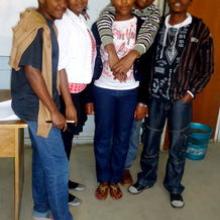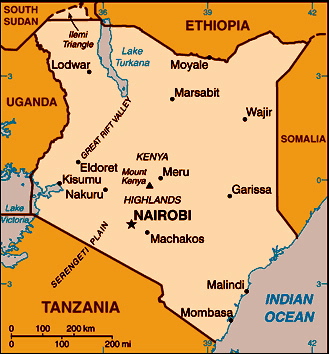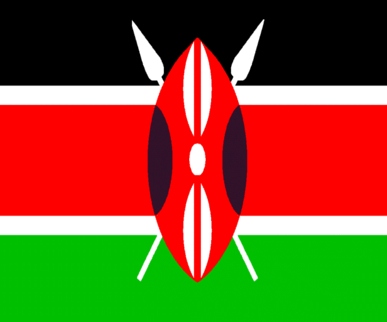
The presidential election in Kenya earlier this month brought victory for Deputy Prime Minister Uhuru Kenyatta. Although the violence associated with the election of 2007 was not repeated, the process has still been far from perfect.
Felix Kimathi (pictured far right) is known to many in Broughton as a former Kenyan exchange visitor to Drummond Community High School, a correspondent with staff and students there, and an occasional writer for the Spurtle.
Still in his teens, he is studying to be a journalist. Here we publish, with his permission, an edited version of two recent emails to Drummond librarian and Kenya Partnership administrator Annie Scanlon in which he reflects on recent events.
I voted for Prime Minister Raila Odinga as president. He has not been indicted for any criminal act, and he fought hard to make Kenya a multi-party state when Daniel arap Moi amended the constitution to make us a 'de jure' one-party state. At that time [1980s–1990s], President Moi was assassinating those who tried to form parties – Odinga barely survived detention and torture.
Odinga has been trying to fight for equality and democracy. He isn't from my tribe or region, and we do not understand each other by our mother tongues, but I am not a tribalist. I believe tribe gives me nothing, and I know a man can live anywhere across the globe.

Heading the armed forces and becoming president are important to Kenyatta so that he can ignore court orders. He used his wealth to employ six helicopters in the electoral campaign, and was successful largely because he managed to lock voters into a tribal/political cocoon. The few who are of liberal mind are in a stupor of fear and defeat.
The results of the election – tainted by allegations of vote rigging and fraud – are now being contested in the Supreme Court.
Worryingly, the foreign nations which bring cheap goods to Kenya and fund many projects here have threatened to pull out if the country brings in a government in which they have no confidence.
Western ambassadors did not congratulate Kenyatta on his win, but merely thanked Kenyans for voting. It has been reported that the UK and US ambassadors did not even visit Kenyatta's office afterwards since they did not choose to work with two principals – Kenyatta and his vice-president-elect William Ruto – who remain criminal suspects.

Given such a political climate, Spurtle checked carefully with Felix before publishing these words. We were concerned for his personal safety. He replied as follows:
'Let me start by telling you not to feel worried about me. According to international media law and regulations, as a student journalist I am allowed to write about anyone as long as I don't invade their privacy or publish false and defamatory statements that I cannot justify.
'The law allows me to write about anything in the public interest.'
Here at the Spurtle, we're still concerned but find Felix's principle, courage and faith in due process an inspiration. Over the last week, students at Drummond CHS have been reading his correspondence and discussing its lessons and implications in class. Click here and here for further background to this story.